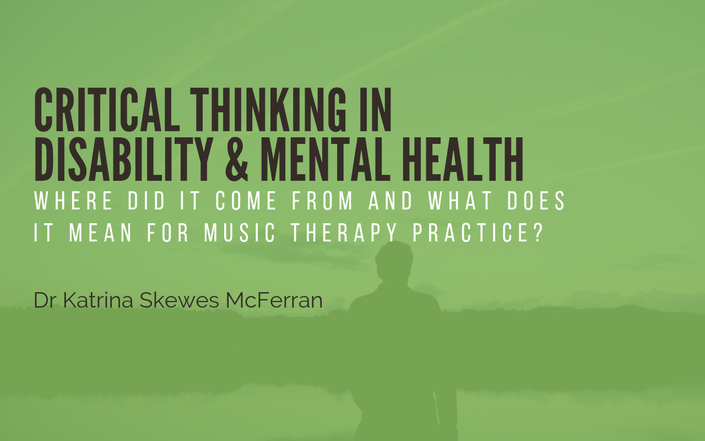
Critical thinking in disability & mental health
Where did it come from and what does it mean for music therapy practice?
Critical thinking is a hot topic for the music therapy profession right now.
How do we recognize our power and privilege in the therapy room?
And how to we negotiate restrictive structures, create equitable goals and best advocate for our clients in disability & mental health?
Bring your practice up to the next level and learn how you can embrace critical approaches in your practice.
Critical thinking has changed the landscape of many fields in which we practice.
The disability sector is no longer a field that focuses on fixing the problems of disabled people, but rather, on promoting the diversity of various types of ability. As a profession we have begun to develop literature and speak to this change - but it may be new to you.
In mental health, the failure of treatment to ‘fix’ mental illness has resulted in recovery models and resource-oriented music therapy has been designed as a congruent approach.
If you trained before these waves of critical thinking surfaced, or didn't cover this in your training course, you may still be practicing in ways that reinforce disadvantage, without intending to.
Being aware of these changes is vital in practicing ethically, developing new practice ideas, and advocating for social justice, equity and anti-oppression for our clients.
Your Instructor

Professor McFerran is one of the worlds leading experts in music therapy for young people. She has researched and published extensively in this area (and many others) and is a recognized thought leader in the international music therapy community. Professor McFerran has worked at the University of Melbourne (Australia) since 2004 and is the Co-Director of both the National Music Therapy Research Unit and the Creative Arts Therapies Research Unit. She continues to work actively as a music therapist with young people through the Creative Arts Therapy Lab that she established in 2016. Kat is also a mother of two teenagers, so her engagement with both critical thinking and young people is both theoretical and applied in every way.
Get started now!
Course Curriculum
-
PreviewIs critical thinking important in music therapy practice? (10:54)
-
Preview1. Introduction, overview & learning outcomes (10:51)
-
Start2. What is critical thinking? Intersectional theory and acknowledging our privilege (6:39)
-
Start3. Normativity and its impact on trauma (6:28)
-
Start4. Power & empowerment: Beyond the therapy room (6:19)
-
Start5. How does this affect your practice? Expert model, access & advocacy (9:09)
-
Start6. How do we best live? The recovery model in mental health (4:28)
-
Start7. Anti-oppressive practices: How can we help clients negotiate restrictive structures? (7:55)
-
Start8. Summary, bonus content & extra resources (3:40)
Earn 1 CMTE/CPD credit for the tutorial
then 3 or more additional credits if you
complete the Bonus Content Activities.



Frequently Asked Questions
FOR MUSIC THERAPISTS IN THE US & CANADA
This tutorial can be submitted as a non-approved self-study option and covers the following CBMT Board Certified Domains:
I REFERRAL, ASSESSMENT, AND TREATMENT PLANNING
B Assessment 4d, e, j, k, l. 8. 9. 11.
C Interpret Assessment Information and Communicate Results - 1. 2. 3. 4.
D Treatment Planning - 1. 2b. 4. 6c. 9. 10. 16.
II TREATMENT IMPLEMENTATION AND TERMINATION
A Implementation 1b, d, e, f. 2c, az.
III EVALUATION
3. 9. 10.
IV PROFESSIONAL DEVELOPMENT AND RESPONSIBILITIES
A. 2. 3.
Please see the TUTORIAL SUMMARY & SUBMISSION INFO doc for specific information on claiming your CMTE/CPD credits. Both the tutorial and each of the article reviews are worth 1+ credit each, and you will be able to claim credits for the MOOC depending on how many hours you complete.

